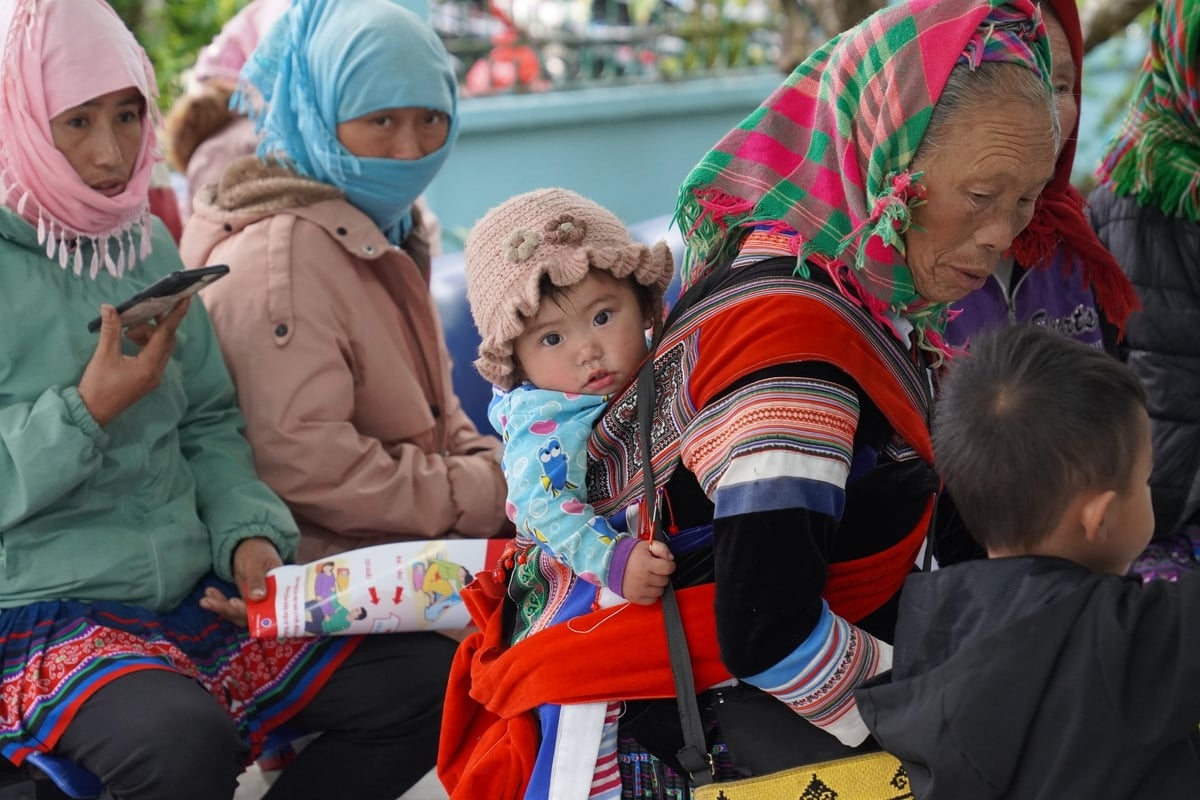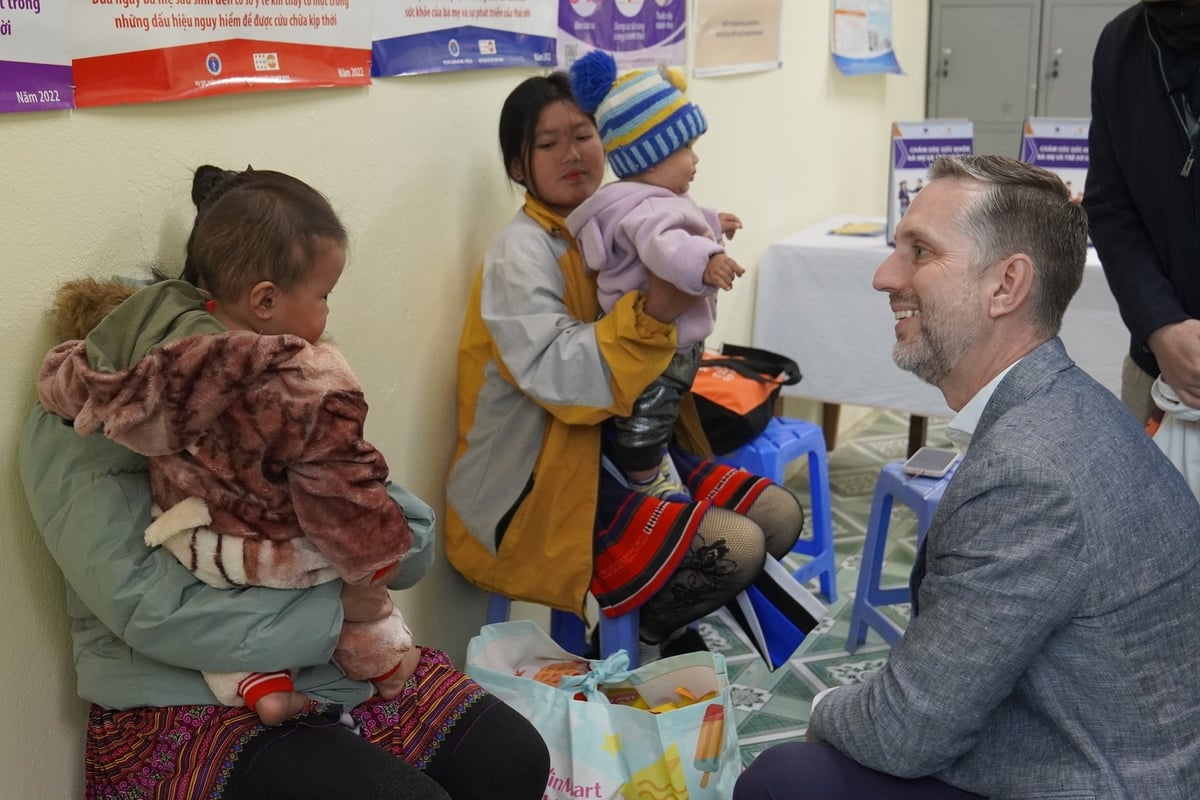June 19, 2025 | 10:56 GMT +7
June 19, 2025 | 10:56 GMT +7
Hotline: 0913.378.918
June 19, 2025 | 10:56 GMT +7
Hotline: 0913.378.918

Maternal mortality rates in ethnic minority communities remain high due to a combination of difficulties in accessing health centres due to mountainous locations and cultural barriers. Photo: UNFPA.
Despite Vietnam’s impressive progress in lowering maternal mortality nationwide, deep inequalities remain entrenched in the country’s most remote and marginalized areas.
In mountainous provinces and among ethnic minority communities, maternal mortality rates still soar between 100 and 150 deaths per 100,000 live births—more than double the national average of 46. The situation is particularly dire for vulnerable groups such as the H’Mong, where women face a risk of maternal death that is seven times higher than that of the Kinh majority. These figures underline the urgency of addressing geographic and socio-cultural barriers that continue to hinder access to essential maternal healthcare.
To evaluate the implementation of interventions aimed at reducing maternal mortality in these high-risk regions, a joint monitoring team from the Ministry of Health, Merck Sharp & Dohme (MSD), and the United Nations Population Fund (UNFPA) conducted a review of the project "Leaving No One Behind: Innovative Interventions to Reduce Maternal Mortality in Ethnic Minority Regions in Vietnam" in Lai Chau Province from April 2-4, 2025.
The project, supported by funding from MSD for Mothers, MSD Viet Nam, and UNFPA, and implemented in collaboration with the Ministry of Health and health departments across six mountainous provinces (Lai Chau, Son La, Bac Kan, Gia Lai, Kon Tum, and Dak Nong), is backed by a budget exceeding USD 2 million. At its core, the initiative seeks to expand access to and enhance the quality of maternal health and family planning services for ethnic minority women—working toward a future where no woman dies from preventable complications during pregnancy and childbirth.
As part of the mission, the team visited Mu Sang Commune Health Station and Phong Tho District Health Center, engaging directly with healthcare workers, local authorities, and ethnic minority women. Despite facing formidable challenges—scarce medical personnel and equipment, rugged terrain, and entrenched cultural barriers—the project has begun to yield tangible results. In Mu Sang Commune alone, the rate of births taking place in medical facilities rose dramatically from 24% in 2022 to 61% in 2024. Additionally, the proportion of women using modern contraceptive methods grew from 59.9% to 62.2% over the three-year period. In 2024, integrated communication activities and campaigns provided reproductive health and family planning services to 339 mothers, and disseminated information to 479 women and men in the commune.
Beyond field visits, the delegation also held meetings with the Lai Chau Provincial People's Committee and the Department of Health to discuss sustainability. Recognizing the project’s early successes, provincial leaders and health authorities pledged to integrate its interventions into local health systems, ensuring long-term improvements in maternal health and stronger grassroots service delivery.

Mr. Matt Jackson, UNFPA Representative in Vietnm, during a field visit to Lai Chau Province. Photo: UNFPA.
These collaborative efforts affirm the necessity of innovative approaches tailored to the realities of remote and ethnic minority communities. UNFPA Representative in Vietnam, Matt Jackson, emphasized this point, stating: “Maternal mortality rates in ethnic minority communities remain high due to a combination of difficulties in accessing health centres due to mountainous locations and cultural barriers. UNFPA is working with partners on innovative solutions to improve the quality and accessibility of maternal health services in priority locations. Results are already showing an increase in antenatal checkups, births in health centres and village-based health workers—all of which contribute to safe births and ending preventable maternal deaths.”
Echoing this commitment, Katharina Geppert, Managing Director of MSD in Vietnam, remarked: “At MSD, we believe every mother deserves access to safe and quality care. Through collaboration with UNFPA and the Government of Vietnam, we are investing in innovative interventions to create a lasting impact on maternal health in the most disadvantaged communities.”
From a national policy perspective, Tran Thi Bich Loan, Deputy Director of the Administration of Maternal and Children’s Affairs at the Ministry of Health, underscored the government’s dedication: “Ensuring the safety of mothers during pregnancy and childbirth is a top priority of the Government of Viet Nam. This project contributes positively to reducing maternal mortality in ethnic minority communities by strengthening the grassroots health system to improve access to quality healthcare services. We are committed to continuing our collaboration with UNFPA, MSD, and partners to ensure that every woman, regardless of location, has the right to a safe pregnancy and childbirth.”
The mission acknowledges Viet Nam's efforts toward achieving the Sustainable Development Goal of reducing maternal mortality by 2030. Timely action and sustainable investment are essential to ensure that no one is left behind.
Translated by Linh Linh

(VAN) To address plastic pollution, closing the plastic recycling cycle will bring significant economic and environmental benefits.

(VAN) According to the Binh Thuan Department of Industry and Trade, in the first five months of 2025, Binh Thuan's dragon fruit export turnover increased by 20.65% compared to the same period last year.

(VAN) EU countries on Thursday gave final approval to new tariffs on fertilizer imports from Russia, a move aimed at cutting off revenue that could support Moscow’s war in Ukraine, despite concerns from European farmers.

(VAN) The working delegation from the Ministry of Agriculture and Environment conducted an important trip to the Netherlands to strengthen strategic partnerships and sustainable development in the agricultural sector.

(VAN) The letter ‘A Plea from the Ocean’ not only evokes emotion but also awakens the human conscience to the responsibility of protecting life on Earth.

(VAN) The Department of Agriculture in South Africa has announced the country’s first mass vaccination of poultry to prevent local birds from contracting avian influenza.

(VAN) Establishment of the Mekong Delta Regional Agricultural Linkage Center, aiming for a closed value chain, deep processing, trading platforms, and international market connectivity.